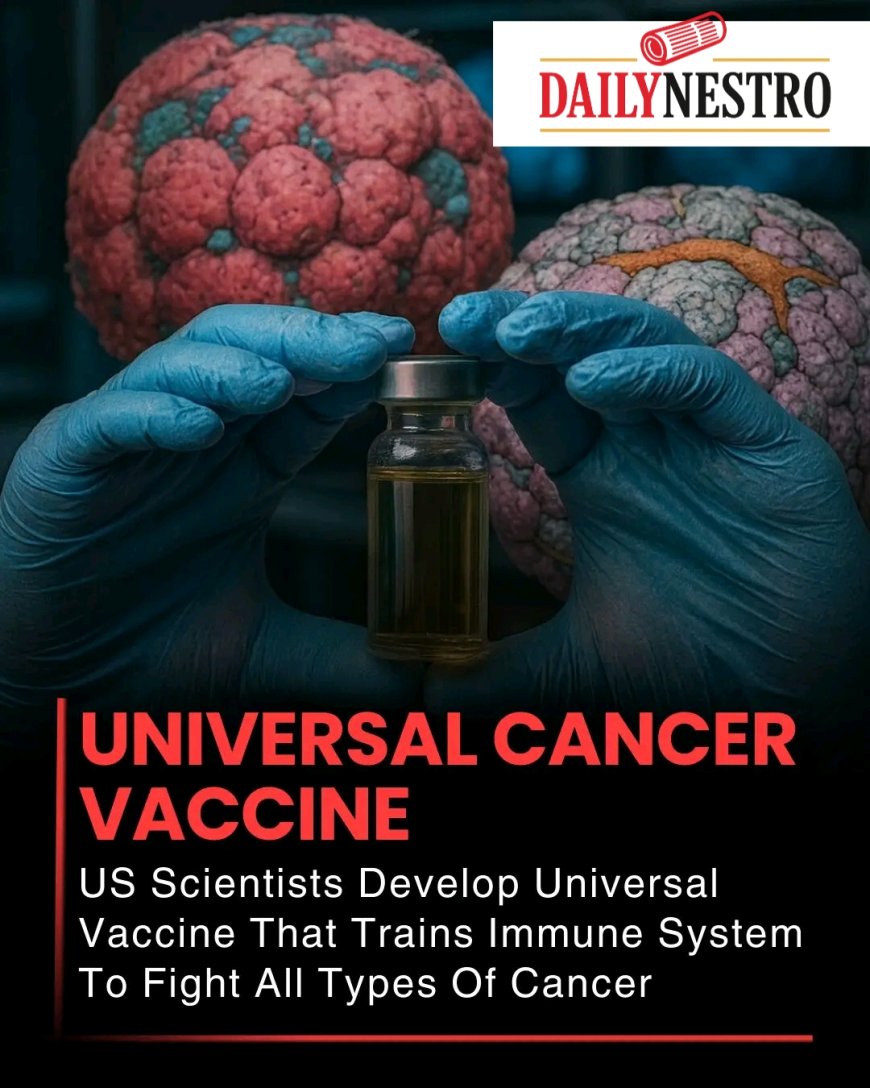JUST IN: USA DEVELOPED VACCINES TO STOP CANCER GROWTH IN THE BODY.
UNIVERSAL CANCER VACCINE US Scientists Develop Universal Vaccine That Trains Immune System To Fight All Types Of Cancer.

In a remarkable leap forward for cancer research, scientists in the United States and globally are actively pursuing the development of a universal cancer vaccine — one that could train the immune system to detect and destroy many types of cancer cells with minimal harm to healthy tissue. While clinical approval is still years away, recent breakthroughs and active trials suggest we may be witnessing the beginning of a new era in oncology.
What Is a Universal Cancer Vaccine?
• Unlike traditional vaccines, which typically target pathogens like viruses, a cancer vaccine is therapeutic — intended to help the immune system fight cancer that already exists.
• The term “universal” refers to the potential to target multiple cancer types with a broadly effective approach, rather than designing a vaccine for each tumor type or individual patient.
How the Approach Works
Most universal vaccine designs under investigation use mRNA technology. However, rather than encoding a single cancer antigen, these next-gen vaccines aim to awaken or amplify anti-cancer immune responses more generally:
• Immune activation — prompting immune cells like dendritic cells and T cells to remain vigilant or hyperactive.
• Epitope spreading — once immune activity begins, it may expand to recognize multiple tumor-specific antigens.
• Microenvironment modulation — altering tumors to be more visible, for example by upregulating molecules like PD-L1.
• Synergy with immunotherapy — combining the vaccine with checkpoint inhibitors (e.g. PD-1/PD-L1 blockers) can enhance tumor destruction.
In animal studies, some vaccine candidates have successfully eliminated tumors across multiple models of cancer, demonstrating the theoretical potential of this approach.
Notable Research and Trials
• University of Florida scientists developed an mRNA universal vaccine that, in mice, revitalized immune responses and improved outcomes even in treatment-resistant tumors when paired with immunotherapy.
• UCLA / Jonsson Comprehensive Cancer Center tested the vaccine ELI-002 2P on patients whose tumors had KRAS mutations (common in pancreatic and colorectal cancers). They saw sustained T-cell responses and longer-than-expected relapse-free survival.
• Mount Sinai / Icahn School of Medicine is conducting trials of a personalized vaccine (PGV001) and investigating universal “off-the-shelf” cellular vaccine techniques.
• Cleveland Clinic is running a Phase 1 trial of a vaccine aiming to prevent recurrence of triple-negative breast cancer, one of the most aggressive subtypes.
• More broadly, over 120 clinical trials worldwide are investigating therapeutic or preventive cancer vaccines for lung, breast, prostate, melanoma, and other cancers according to Pubmed
Hospitals & Institutions With Vaccine or Immunotherapy Programs
While no hospital currently offers a fully approved universal cancer vaccine, many major cancer centers offer vaccine trials or immunotherapy studies:
• Roswell Park Comprehensive Cancer Center (USA) — offers vaccine/immunotherapy trials for prostate cancer, glioblastoma, lung cancer, breast cancer, and more.
• Karmanos Cancer Institute (Detroit, USA) — robust clinical trials infrastructure as a National Cancer Institute–designated center.
• Mount Sinai Health System / Icahn School of Medicine — active in vaccine research and trials.
Patients interested in participating may consult these centers or search clinical trial registries (e.g. ClinicalTrials.gov) to see if they qualify.
Challenges Ahead
Developers must address several key obstacles:
• Safety and autoimmunity risk — broad immune activation must not trigger damage to normal tissues.
• Tumor heterogeneity — different patients’ tumors may express different antigens or evolve resistance.
• Translation from animals to humans — many treatments that succeed in mice fail in humans.
• Manufacturing & cost — the complexity of vaccines (especially mRNA or cellular types) presents scale-up challenges.
• Regulation & approval — proving efficacy in large human populations will require major, costly trials.
What to Watch For Next
• Successful Phase 1/2 human trials of universal vaccine candidates.
• Data showing long-term safety and efficacy, including preventing recurrence.
• Regulatory decisions and FDA or equivalent agency guidance on novel vaccine approval pathways.
• Commercial manufacturing and global rollout strategies, particularly for lower-resource settings.







